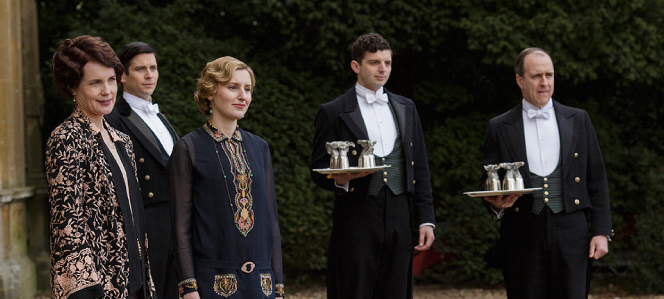With “Downton Abbey” kicking off its sixth and final season this week, we share this 2012 post from Word on Fire contributor Ellyn von Huben reflecting on the British runaway hit.
I am a relative latecomer to the party that is the Sunday night phenomenon—”Downton Abbey.” Years ago, somewhere along the line, the evening of the day of rest was taken over with preparations for Monday—especially when my children were younger. During their school days, Sunday night meant organizing homework, laundry, permission slips, and all things in a mother’s arsenal. Masterpiece Theater became a faint memory from high school days. But all the talk about “Downton Abbey” made me curious; this had to be something more than just a costume drama for Grandmas to watch while sipping their Sleepy Time tea.
It took less than one episode for me to be drawn in. (Luckily, season one was still available via NetFlix for me to play catch up. Alas, it no longer is. Sorry.)
“Downton Abbey” is the fictional home of the Crawley family, Lord and Lady Grantham, their three daughters, Lord Grantham’s third-cousin-once-removed and heir, Matthew, assorted hangers-on, and all the help that is needed to make such a ponderous abode function in the early years of the twentieth century.
When TV offers such an assortment of entertainment that centers on scandalous families, both fictional and “reality” based, why is there so much appeal in these straitlaced Edwardians? Beyond the abundant eye candy of the beautiful setting and gorgeous wardrobe, there is a great deal of appeal to a story set in a time that is so constrained in desires and actions. One could almost say that the corseted torsos and disciplined postures symbolize the internal bearing of the characters.
Human emotions remain the same throughout time, but here we have a display of characters who are much more centered on virtue—or, at the very least, the semblance of virtue. Living at time when it seems “Anything Goes”, I think the aspirational appeal of “Downton Abbey” goes beyond the desire for manor houses and the assorted trappings of inherited wealth. People who are trying to do the right thing make for fascinating drama. (Fascinating and frustrating, in the case of kitchen maid Daisy who has done what, to me, is the right thing—if you watch you know what I mean—but is convinced that she has committed a terrible wrong. I can’t imagine a character in a contemporary drama having such qualms. And how many of you fans have seen a man of such deep conviction as Mr. Bates?)
Yes, some of the quandaries are comical to us, such as the dilemma of having women serve a meal in the absence of footmen. Of course, there is the humorous contrast with our lives today: The discovery of a maid in posession of a typewriter and the household staff’s gathering around to examine such a bizarre device; Lady Cora’s distrust of electricity; and, less than one hundred years ago, the upheaval of having a telephone installed in the home. But the real pull of the story is in the very dynamic tension of characters trying to do what is right; with the few truly bad eggs like Thomas and Vera plus the unbearably sanctimonious cousin Isobel, to complicate matters.
I wasn’t very far into the series when it also dawned on me that “Downton Abbey” is something of an analogy for the world and our place in it. We gossip, back-stab, connive to get ahead, and begin to feel an inappropriate ownership of the things of this world in which we live in but do not own. We are trusted with the care of this world, but it is not ours to take liberties with. Someday it will slip away from us. The “help” connive and hope to manipulate the Lord of the house to make things work to their benefit. (Unlike Lord Grantham, the Lord who sees our hearts cannot be fooled. But he treats his servants with compassion and mercy.)
The Crawley family—Lord Grantham, his heirs, descendants and others—likewise are only caretakers. Downton Abbey does not belong to Robert Crawley any more than it belongs to the lowliest footman. The Crawleys are only passing through, though with more material benefits from the accident of their birth.
Underneath the intrigue, romance and manners is one enduring lesson: For we brought nothing into the world, just as we shall not be able to take anything out of it (1 Tim 6:7).
